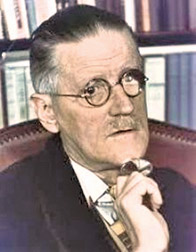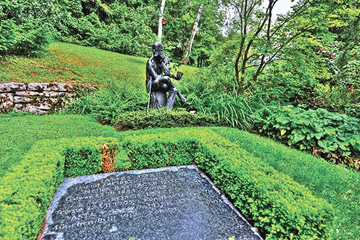James Joyce and 'Stream of Consciousness'
by W.T.J.S. Kaviratne
James Augustine Aloysius Joyce was born at Brighton Square, in a
Dublin suburb of Rathgar in Ireland in 1882. His father was John
Stanislaus Joyce and Mary John Murray was his mother.
James Joyce was the eldest of the family of ten children and he had
to give up his education in 1886 as his father found it difficult to pay
the fees for his education at Clongowes Wood College and since then he
studied at home and later joined 'Christian Brothers O' Connell School
in Dublin.
|

James Joyce |
In 1898 Joyce entered the University College of Dublin where he
studied English, French and Italian.
Thomas Kettle, Francis Sheethy Skeffington, Oliver St.John were some
of his University colleagues portrayed in majority of his works.
Just after graduation when he was 20 he left for Paris where he had
to work as a journalist and an English teacher to overcome financial
constraints. In addition, he explored explored avenues to set up an
agency to sell Irish Tweed in Tristie. James Joyce left for Paris in
1902 to study medicine which proved to be an unsuccessful endeavour. In
1904, he and his partner Nora Barnacle emigrated to Europe and lived in
Tristie, Paris and Zurich. His literary works comprised Chamber Music
(poems - 1907), 'Dubliners' (short story collection - 1914), 'A Portrait
of the Artist as a Young Man' - (Novel - 1916) Exiles' (Play - 1918),
'Ulysses' (Novel - 1922), 'Poems Pennyeach' (Poems - 1927) and 'Finnnegans
Wake (Novel- 1939).
"Ulysses has been identified as a masterpiece that belongs to the
genre of Modernist Avant-garde literature of the 20th century.
Ulysses has been divided into three parts having 18 episodes based on
separate themes and the names of the episodes are parallel to the
events, locations and the supernatural beings depicted in Homer's
Odyssey.
'Telemachus', 'Nestor', 'The Odyssey', 'Hades' , 'Scylla and
Charybdis', 'Penelope', 'Ithaca' are some of the names of the episodes
of the Ulysses.
The setting of Ulysses was in Dublin and its action took place in
June 16th 1904. The three main characters of Ulysses were Leopold Bloom
a Jewish advertising agent and his wife Moly and Stephen Dedalus.
To give an epic touch of Homer's Odyssey, James Joyce portrayed them
as the modern counterparts of Telemachus, Ulysses, and Penelope.
An American psychologist William James introduced the term 'Stream of
Consciousness'. Irrespective of whether the stream of consciousness or
the stream of thoughts make neither sense nor in sequential order, it is
believed that the stream of thought reveals the memories, the fantasies,
ambitions, emotions, rational and irrational ideas of the character.
James Joyce had exploited 'interior monologue' in Ulysses and many of
his works.
He had effectively used the technique of ' stream of conscious' in
his novel Ulysses to bring in some parallelism to the epic adventures of
Odysseus during his homeward bound journey.
Leopold Bloom's adventures in comparison to Odysseus were less heroic
and less violent.
Facets of life
Just attending a funeral that took place in 'Glasnevin Cemetery,
James Joyce made the reader to feel that Leopold Bloom made a visit to
the Underworld.
 In Leopold's words: "We are praying now for the repose of his soul.
Hoping you are well and not in hell. In Leopold's words: "We are praying now for the repose of his soul.
Hoping you are well and not in hell.
Out of frying pan of life into the fire of purgatory."
Except a few visits to Ireland, James Joyce spent most of his life in
Paris, Trieste, Rome and Zurich, but all his works were based on every
facet of the lives of the people of Ireland.
Just after the compilation of Ulysses, James Joyce proclaimed : "For
myself, I always write about Dublin because if I can get to the heart of
Dubliners, I can get to the heart of all the cities of the world."
Literary critic Edmund Wilson said, "Ulysses attempts to render as
precisely and as directly as it is possible in words, to do, what our
participation in life is like or rather what it seems to us like as from
moment to moment we live." James Joyce's art of joining metaphors,
symbols and ambiguities together had an integrating effect or the
building of a connection which could provide a Universal significance to
both the plot and themes of the novel. Leopold Bloom had been identified
as Ulysses and in the same manner James Joyce identified everyman living
in Dublin as the microcosm of the world.
A journey in search of something is inherent among humans and this
inherent human trait could be found in many of the characters portrayed
in the works of James Joyce.
The novel Ulysses is rich in numerous themes such as guilt (Stephen
Dedalus and his mother), infidelity (Molly Bloom and Bazes Boylan),
anti-semitism (The Citizen insulting Bloom), sexual temptation (Bloom,
Ogling, Gerty, Macdowel)l, cycle of life from birth to death, (Mina
Purefoy's and the death of Paddy Dignam). James Joyce had been
influenced by the philosophical teachings of Thomas Aquinas while he had
been of great influence on writers and scholars of the calibre of Samuel
Bekett, Sean O Riordain, Flann O' Brien, Salman Rushdie, Joseph Campbell
and David Lodge.
Religion
James Joyce had satirised religion, culture and literary movements of
the day in Ulysses. Due to the literary technique of 'the Stream of
Consciousness', numerous symbols, allusions and the structure, the novel
Ulysses appeared to be difficult to understand and James Joyce once said
that he had 'put on so many enigmas and puzzles that will keep
Professors busy for centuries arguing over what I meant which would earn
the novel immortality.'
T.S. Eliot in his review on Ulysses in The Dial said, "I hold this
book to be the most important expression which the present age has
found. It is a book to which we are all indebted from which none of us
can escape."
Eliot further said, "James Joyce was not at fault if people after him
did not understand it."
Children
Dubliners comprised 15 short stories compiled by James Joyce in 1914,
depicting the lives of the middle class people of Dublin who lived in
the early part of the 20th century.
"The Sisters", "An Encounter", "Araby", "Eveline" "A Painful Case"
and "The Dead" are among the 15 short stories in Dubliners.
The protagonists at the beginning of the first few stories were
children who narrated the stories in the Dubliners.
The stories gradually deal on the issues of the elderly men and women
in Dublin society.
Dublin during the era of James Joyce was less cosmopolitan in
comparison to other Western cities. According to James Joyce the
backward nature of Dublin was a direct consequence of the influence of
the Roman Catholic Church and the neighbouring country of England.
The literary critics are of the opinion that the anthology of short
stories in Dubliners is a penetrating analysis of James Joyce of the
stagnation and the paralysis of Dublin society.
Poverty, defeat, powerlessness, imprisonment, paralysis, loneliness,
alienation and the longing to escape are the striking themes of the 15
short story collection of Dubliners. Failed communication is also
portrayed in the stories and James Joyce constantly tried to portray
Dublin as a prison in" Dubliners."
The boys in the short story " An Encounter", tried to escape the
tedium of Dublin.
Eveline was frightened to escape Ireland at the last moment.
Escape is one of the major themes of the story " A Portrait of the
Artist as a Young Man." James Joyce's portrayal of the life of the
Dubliners is not confined to the poor and the middle class in Dublin but
focuses beyond the small circle and expands towards the different
periods of the lives of humankind which is of universal significance.
Based on Freud's Dream Psychology the novel "Finnegans Wake" was
identified as a revolutionary work of James Joyce. The theme of dreams
and nightmares have been highlighted in Finnegans Wake.
James Joyce died on January 9, 1941 in Zurich, Switzerland and buried
in the cemetery of Flutern Park, in Zurich. |

